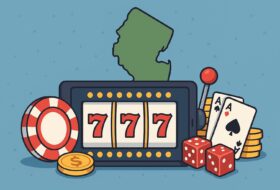
Virginia senator Mamie Locke pre-filed legislation on Dec. 31, 2024, to legalize online casinos in the state.
Senate Bill 827, which Locke will formally introduce tomorrow, Jan. 8, would allow Virginia’s licensed retail casinos to apply for online licenses. Under her proposal, each approved casino could then partner with up to three online providers, or “skins.”
Once introduced, the online casino bill will move to Virginia’s Committee on General Laws and Technology. However, Virginia’s legislative sessions are extremely short in odd-numbered years—just 30 days—and this will be Virginia lawmakers’ first look at the possibility of online casinos, so the bill’s odds of immediate success appear small.
Operators will pay $1 million for a five-year license
According to SB 827’s text, if passed, it would require casino gaming operators to pay a $1 million application fee. Once issued, the online license will be valid for five years.
Locke’s bill also requires operators to implement a “single distinct brand” for each platform offered. However, it also allows operators to use a second distinct brand to offer poker or combine online casino and poker offerings on a single branded platform.
In either case, the platforms do not have to be branded or co-branded with the existing internet or casino operator brands.
Additionally, platform providers must apply for licenses, which cost $50,000 for five years. A temporary, one-year platform provider license is also available for a $10,000 fee.
The bill calls for an operator tax of 15% of their adjusted gross internet gaming revenue, which the bill defines as:
The amount of money paid as Internet wagers minus (i) all winnings and the cash value of merchandise paid out as winnings to bettors and (ii) uncollectible gaming receivables, which shall not exceed two percent, or a different percentage as determined by the Board, of gross revenue minus all cash paid out as winnings to bettors.
It also stipulates that 2.5% of collected tax revenues go to the state’s Problem Gambling Treatment and Support Fund, with the remaining 97.5% earmarked for the general fund.
Consumer protections required
Under SB 827, the director of the Virginia Lottery can open a 30-day application window and start accepting applications as of July 1 of this year. It also stipulates that the Virginia Lottery Board “promulgate regulations necessary to implement the provision of this act” by Sept. 30, 2025.
Further, the bill includes standard consumer and problem gambling protections, including age (21+) and location verifications, limit setting, and voluntary self-exclusion.
It also requires that operators “prominently” display 1-800-GAMBLER and the phrase ‘gambling problem’ to all users and employ mechanisms to “detect and prevent money laundering, fraud, and collusion.”
Possible Roadblocks Ahead
Typically, the success of online casino legislation is heavily dependent on the support of retail operators. While it’s likely Caesars and Rush Street Gaming—who operate casinos in Danville and Portsmouth—will back the legislation, the same cannot be said for all Virginia operators.
Cordish Companies, which were selected to build a retail casino in Petersburg, have historically opposed online casino expansion, most recently in Maryland and Louisiana.
However, as Straight to the Point‘s Steve Ruddock pointed out in a recent newsletter, Cordish’s stance is more complicated.
As Ruddock wrote:
The company has been very upfront about its stance — It’s opposed to it, but if it’s legal, it will be involved — Parx Casino took a similar stance when Pennsylvania considered online gambling legalization in 2016.
Cordish believes online revenue eats into land-based revenue and doesn’t think that that phenomenon is confined to each operator. Simply put, if an online operator is going to steal some of Cordish’s land-based properties’ revenue (its belief, not mine), it may as well be Cordish.
As such, the decision to tether online casino licensing to retail casinos could entice one of iGaming’s most hardline retail detractors to support Locke’s effort.





